NUR121: Improving Bowel Cancer Programs in Australian Healthcare
VerifiedAdded on 2023/04/04
|9
|2367
|199
Homework Assignment
AI Summary
This assignment solution addresses bowel cancer as a significant health issue in Australia, highlighting its prevalence and mortality rates. It examines health promotion programs like the National Bowel Cancer Screening Program (NBCSP) and workplace toolkits, emphasizing early screening, health education, and lifestyle modifications. The assignment analyzes how these programs align with primary healthcare principles, including health equity, community participation, and intersectoral collaboration. It also evaluates health promotion strategies guided by the Ottawa Charter, such as creating supportive environments and developing personal skills. The solution concludes with recommendations for improving the program, particularly by incorporating culturally competent care for Indigenous populations to address health inequalities. Desklib offers a variety of resources for students, including past papers and solved assignments.
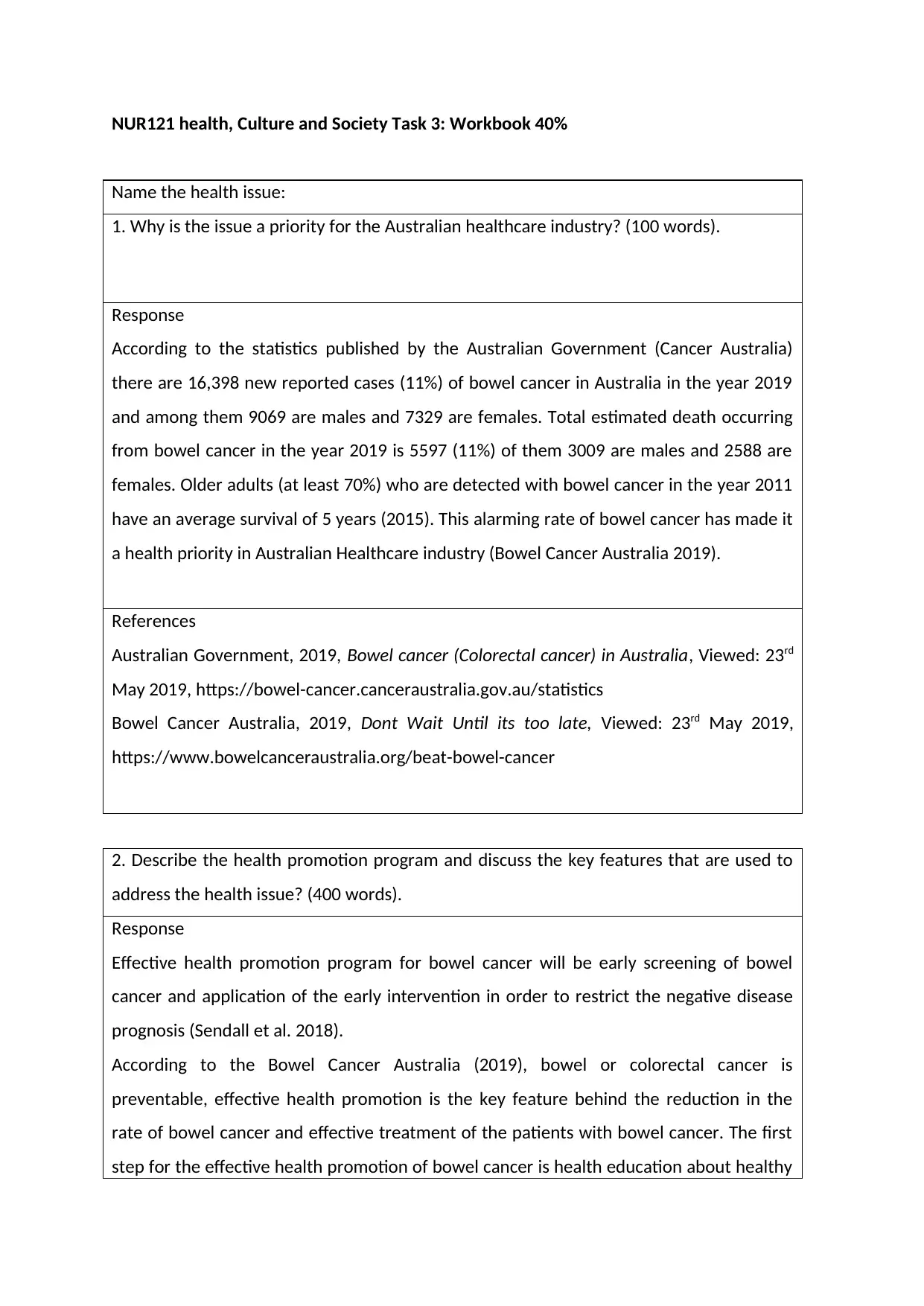
NUR121 health, Culture and Society Task 3: Workbook 40%
Name the health issue:
1. Why is the issue a priority for the Australian healthcare industry? (100 words).
Response
According to the statistics published by the Australian Government (Cancer Australia)
there are 16,398 new reported cases (11%) of bowel cancer in Australia in the year 2019
and among them 9069 are males and 7329 are females. Total estimated death occurring
from bowel cancer in the year 2019 is 5597 (11%) of them 3009 are males and 2588 are
females. Older adults (at least 70%) who are detected with bowel cancer in the year 2011
have an average survival of 5 years (2015). This alarming rate of bowel cancer has made it
a health priority in Australian Healthcare industry (Bowel Cancer Australia 2019).
References
Australian Government, 2019, Bowel cancer (Colorectal cancer) in Australia, Viewed: 23rd
May 2019, https://bowel-cancer.canceraustralia.gov.au/statistics
Bowel Cancer Australia, 2019, Dont Wait Until its too late, Viewed: 23rd May 2019,
https://www.bowelcanceraustralia.org/beat-bowel-cancer
2. Describe the health promotion program and discuss the key features that are used to
address the health issue? (400 words).
Response
Effective health promotion program for bowel cancer will be early screening of bowel
cancer and application of the early intervention in order to restrict the negative disease
prognosis (Sendall et al. 2018).
According to the Bowel Cancer Australia (2019), bowel or colorectal cancer is
preventable, effective health promotion is the key feature behind the reduction in the
rate of bowel cancer and effective treatment of the patients with bowel cancer. The first
step for the effective health promotion of bowel cancer is health education about healthy
Name the health issue:
1. Why is the issue a priority for the Australian healthcare industry? (100 words).
Response
According to the statistics published by the Australian Government (Cancer Australia)
there are 16,398 new reported cases (11%) of bowel cancer in Australia in the year 2019
and among them 9069 are males and 7329 are females. Total estimated death occurring
from bowel cancer in the year 2019 is 5597 (11%) of them 3009 are males and 2588 are
females. Older adults (at least 70%) who are detected with bowel cancer in the year 2011
have an average survival of 5 years (2015). This alarming rate of bowel cancer has made it
a health priority in Australian Healthcare industry (Bowel Cancer Australia 2019).
References
Australian Government, 2019, Bowel cancer (Colorectal cancer) in Australia, Viewed: 23rd
May 2019, https://bowel-cancer.canceraustralia.gov.au/statistics
Bowel Cancer Australia, 2019, Dont Wait Until its too late, Viewed: 23rd May 2019,
https://www.bowelcanceraustralia.org/beat-bowel-cancer
2. Describe the health promotion program and discuss the key features that are used to
address the health issue? (400 words).
Response
Effective health promotion program for bowel cancer will be early screening of bowel
cancer and application of the early intervention in order to restrict the negative disease
prognosis (Sendall et al. 2018).
According to the Bowel Cancer Australia (2019), bowel or colorectal cancer is
preventable, effective health promotion is the key feature behind the reduction in the
rate of bowel cancer and effective treatment of the patients with bowel cancer. The first
step for the effective health promotion of bowel cancer is health education about healthy
Paraphrase This Document
Need a fresh take? Get an instant paraphrase of this document with our AI Paraphraser
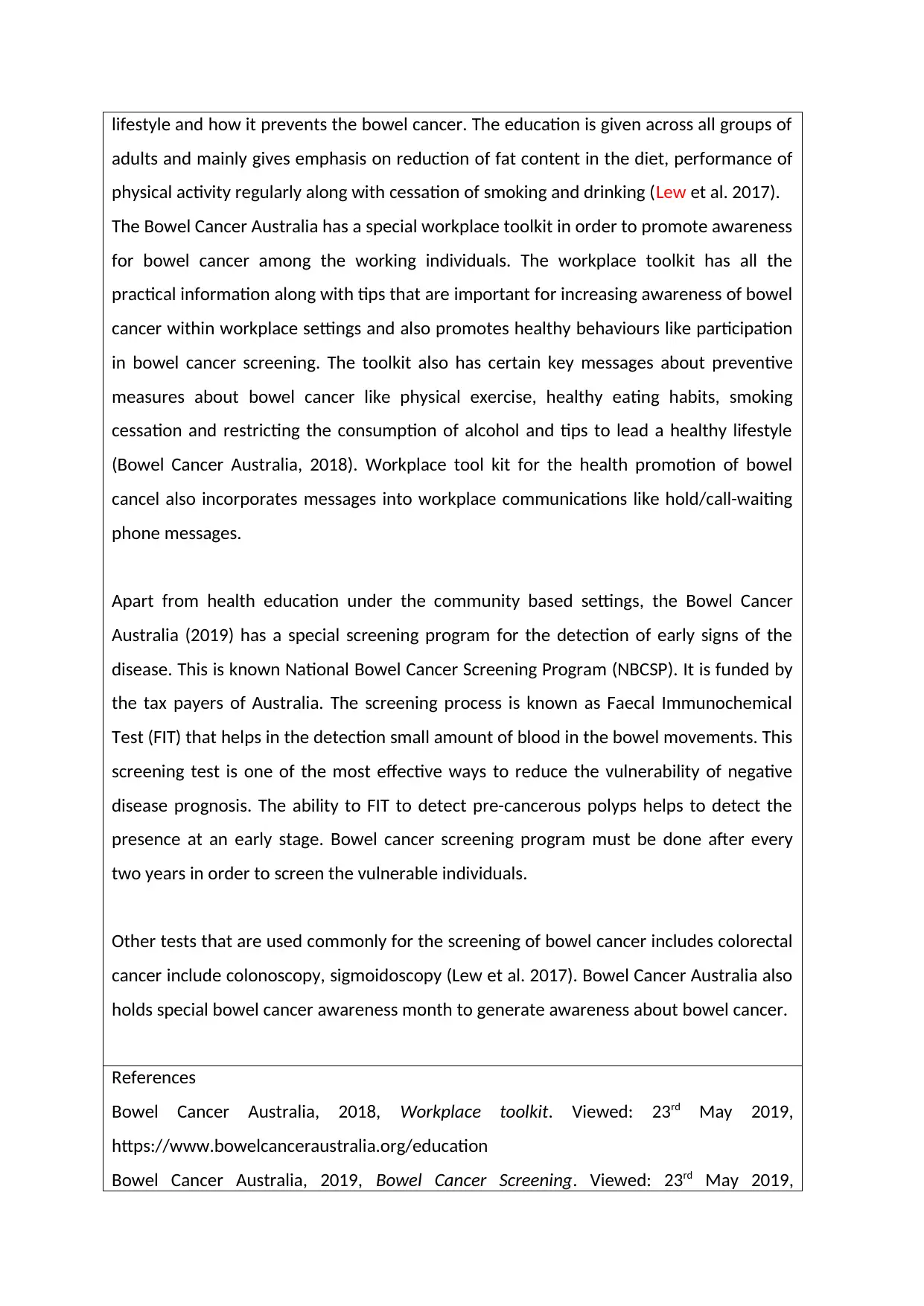
lifestyle and how it prevents the bowel cancer. The education is given across all groups of
adults and mainly gives emphasis on reduction of fat content in the diet, performance of
physical activity regularly along with cessation of smoking and drinking (Lew et al. 2017).
The Bowel Cancer Australia has a special workplace toolkit in order to promote awareness
for bowel cancer among the working individuals. The workplace toolkit has all the
practical information along with tips that are important for increasing awareness of bowel
cancer within workplace settings and also promotes healthy behaviours like participation
in bowel cancer screening. The toolkit also has certain key messages about preventive
measures about bowel cancer like physical exercise, healthy eating habits, smoking
cessation and restricting the consumption of alcohol and tips to lead a healthy lifestyle
(Bowel Cancer Australia, 2018). Workplace tool kit for the health promotion of bowel
cancel also incorporates messages into workplace communications like hold/call-waiting
phone messages.
Apart from health education under the community based settings, the Bowel Cancer
Australia (2019) has a special screening program for the detection of early signs of the
disease. This is known National Bowel Cancer Screening Program (NBCSP). It is funded by
the tax payers of Australia. The screening process is known as Faecal Immunochemical
Test (FIT) that helps in the detection small amount of blood in the bowel movements. This
screening test is one of the most effective ways to reduce the vulnerability of negative
disease prognosis. The ability to FIT to detect pre-cancerous polyps helps to detect the
presence at an early stage. Bowel cancer screening program must be done after every
two years in order to screen the vulnerable individuals.
Other tests that are used commonly for the screening of bowel cancer includes colorectal
cancer include colonoscopy, sigmoidoscopy (Lew et al. 2017). Bowel Cancer Australia also
holds special bowel cancer awareness month to generate awareness about bowel cancer.
References
Bowel Cancer Australia, 2018, Workplace toolkit. Viewed: 23rd May 2019,
https://www.bowelcanceraustralia.org/education
Bowel Cancer Australia, 2019, Bowel Cancer Screening. Viewed: 23rd May 2019,
adults and mainly gives emphasis on reduction of fat content in the diet, performance of
physical activity regularly along with cessation of smoking and drinking (Lew et al. 2017).
The Bowel Cancer Australia has a special workplace toolkit in order to promote awareness
for bowel cancer among the working individuals. The workplace toolkit has all the
practical information along with tips that are important for increasing awareness of bowel
cancer within workplace settings and also promotes healthy behaviours like participation
in bowel cancer screening. The toolkit also has certain key messages about preventive
measures about bowel cancer like physical exercise, healthy eating habits, smoking
cessation and restricting the consumption of alcohol and tips to lead a healthy lifestyle
(Bowel Cancer Australia, 2018). Workplace tool kit for the health promotion of bowel
cancel also incorporates messages into workplace communications like hold/call-waiting
phone messages.
Apart from health education under the community based settings, the Bowel Cancer
Australia (2019) has a special screening program for the detection of early signs of the
disease. This is known National Bowel Cancer Screening Program (NBCSP). It is funded by
the tax payers of Australia. The screening process is known as Faecal Immunochemical
Test (FIT) that helps in the detection small amount of blood in the bowel movements. This
screening test is one of the most effective ways to reduce the vulnerability of negative
disease prognosis. The ability to FIT to detect pre-cancerous polyps helps to detect the
presence at an early stage. Bowel cancer screening program must be done after every
two years in order to screen the vulnerable individuals.
Other tests that are used commonly for the screening of bowel cancer includes colorectal
cancer include colonoscopy, sigmoidoscopy (Lew et al. 2017). Bowel Cancer Australia also
holds special bowel cancer awareness month to generate awareness about bowel cancer.
References
Bowel Cancer Australia, 2018, Workplace toolkit. Viewed: 23rd May 2019,
https://www.bowelcanceraustralia.org/education
Bowel Cancer Australia, 2019, Bowel Cancer Screening. Viewed: 23rd May 2019,
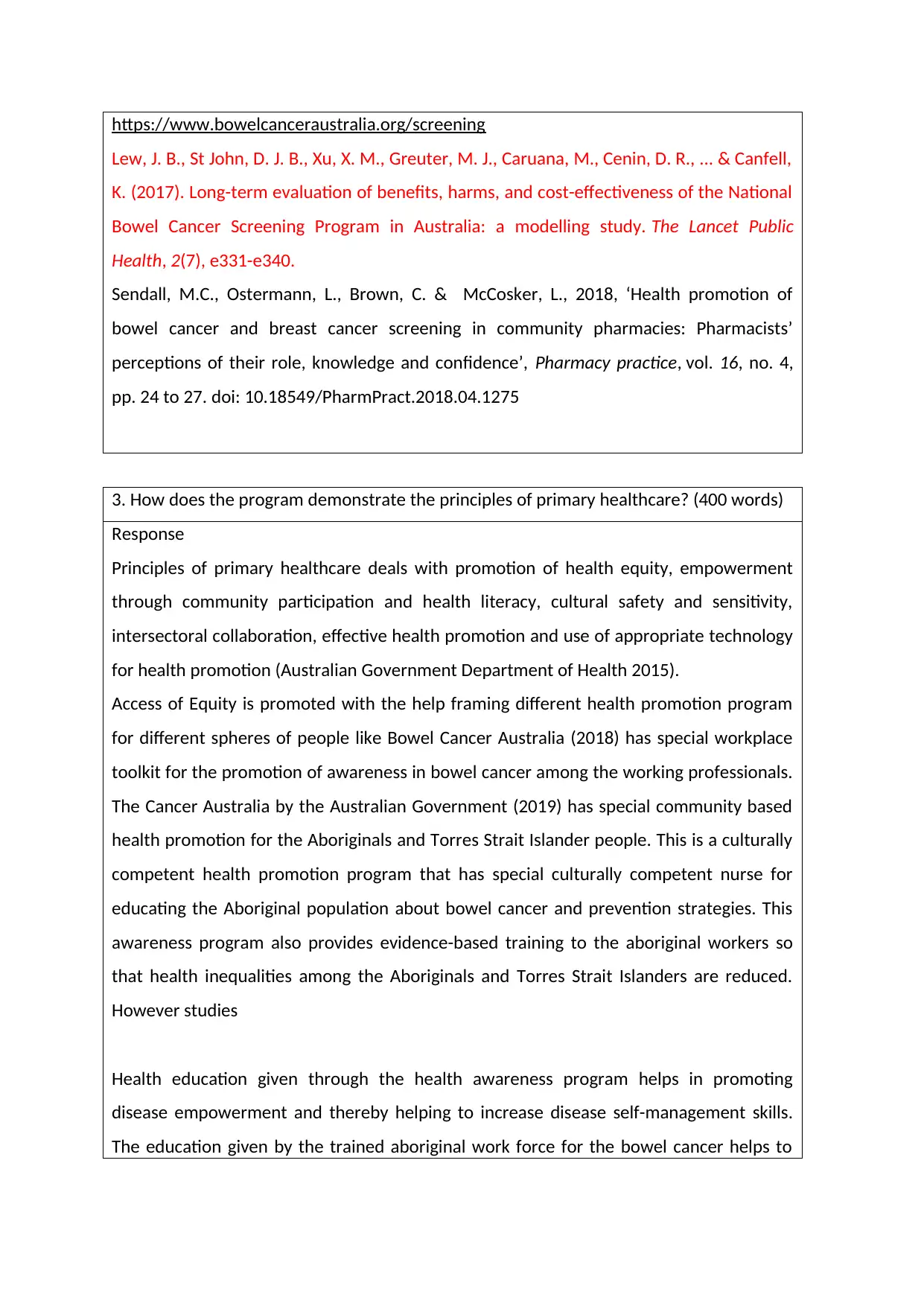
https://www.bowelcanceraustralia.org/screening
Lew, J. B., St John, D. J. B., Xu, X. M., Greuter, M. J., Caruana, M., Cenin, D. R., ... & Canfell,
K. (2017). Long-term evaluation of benefits, harms, and cost-effectiveness of the National
Bowel Cancer Screening Program in Australia: a modelling study. The Lancet Public
Health, 2(7), e331-e340.
Sendall, M.C., Ostermann, L., Brown, C. & McCosker, L., 2018, ‘Health promotion of
bowel cancer and breast cancer screening in community pharmacies: Pharmacists’
perceptions of their role, knowledge and confidence’, Pharmacy practice, vol. 16, no. 4,
pp. 24 to 27. doi: 10.18549/PharmPract.2018.04.1275
3. How does the program demonstrate the principles of primary healthcare? (400 words)
Response
Principles of primary healthcare deals with promotion of health equity, empowerment
through community participation and health literacy, cultural safety and sensitivity,
intersectoral collaboration, effective health promotion and use of appropriate technology
for health promotion (Australian Government Department of Health 2015).
Access of Equity is promoted with the help framing different health promotion program
for different spheres of people like Bowel Cancer Australia (2018) has special workplace
toolkit for the promotion of awareness in bowel cancer among the working professionals.
The Cancer Australia by the Australian Government (2019) has special community based
health promotion for the Aboriginals and Torres Strait Islander people. This is a culturally
competent health promotion program that has special culturally competent nurse for
educating the Aboriginal population about bowel cancer and prevention strategies. This
awareness program also provides evidence-based training to the aboriginal workers so
that health inequalities among the Aboriginals and Torres Strait Islanders are reduced.
However studies
Health education given through the health awareness program helps in promoting
disease empowerment and thereby helping to increase disease self-management skills.
The education given by the trained aboriginal work force for the bowel cancer helps to
Lew, J. B., St John, D. J. B., Xu, X. M., Greuter, M. J., Caruana, M., Cenin, D. R., ... & Canfell,
K. (2017). Long-term evaluation of benefits, harms, and cost-effectiveness of the National
Bowel Cancer Screening Program in Australia: a modelling study. The Lancet Public
Health, 2(7), e331-e340.
Sendall, M.C., Ostermann, L., Brown, C. & McCosker, L., 2018, ‘Health promotion of
bowel cancer and breast cancer screening in community pharmacies: Pharmacists’
perceptions of their role, knowledge and confidence’, Pharmacy practice, vol. 16, no. 4,
pp. 24 to 27. doi: 10.18549/PharmPract.2018.04.1275
3. How does the program demonstrate the principles of primary healthcare? (400 words)
Response
Principles of primary healthcare deals with promotion of health equity, empowerment
through community participation and health literacy, cultural safety and sensitivity,
intersectoral collaboration, effective health promotion and use of appropriate technology
for health promotion (Australian Government Department of Health 2015).
Access of Equity is promoted with the help framing different health promotion program
for different spheres of people like Bowel Cancer Australia (2018) has special workplace
toolkit for the promotion of awareness in bowel cancer among the working professionals.
The Cancer Australia by the Australian Government (2019) has special community based
health promotion for the Aboriginals and Torres Strait Islander people. This is a culturally
competent health promotion program that has special culturally competent nurse for
educating the Aboriginal population about bowel cancer and prevention strategies. This
awareness program also provides evidence-based training to the aboriginal workers so
that health inequalities among the Aboriginals and Torres Strait Islanders are reduced.
However studies
Health education given through the health awareness program helps in promoting
disease empowerment and thereby helping to increase disease self-management skills.
The education given by the trained aboriginal work force for the bowel cancer helps to
⊘ This is a preview!⊘
Do you want full access?
Subscribe today to unlock all pages.

Trusted by 1+ million students worldwide
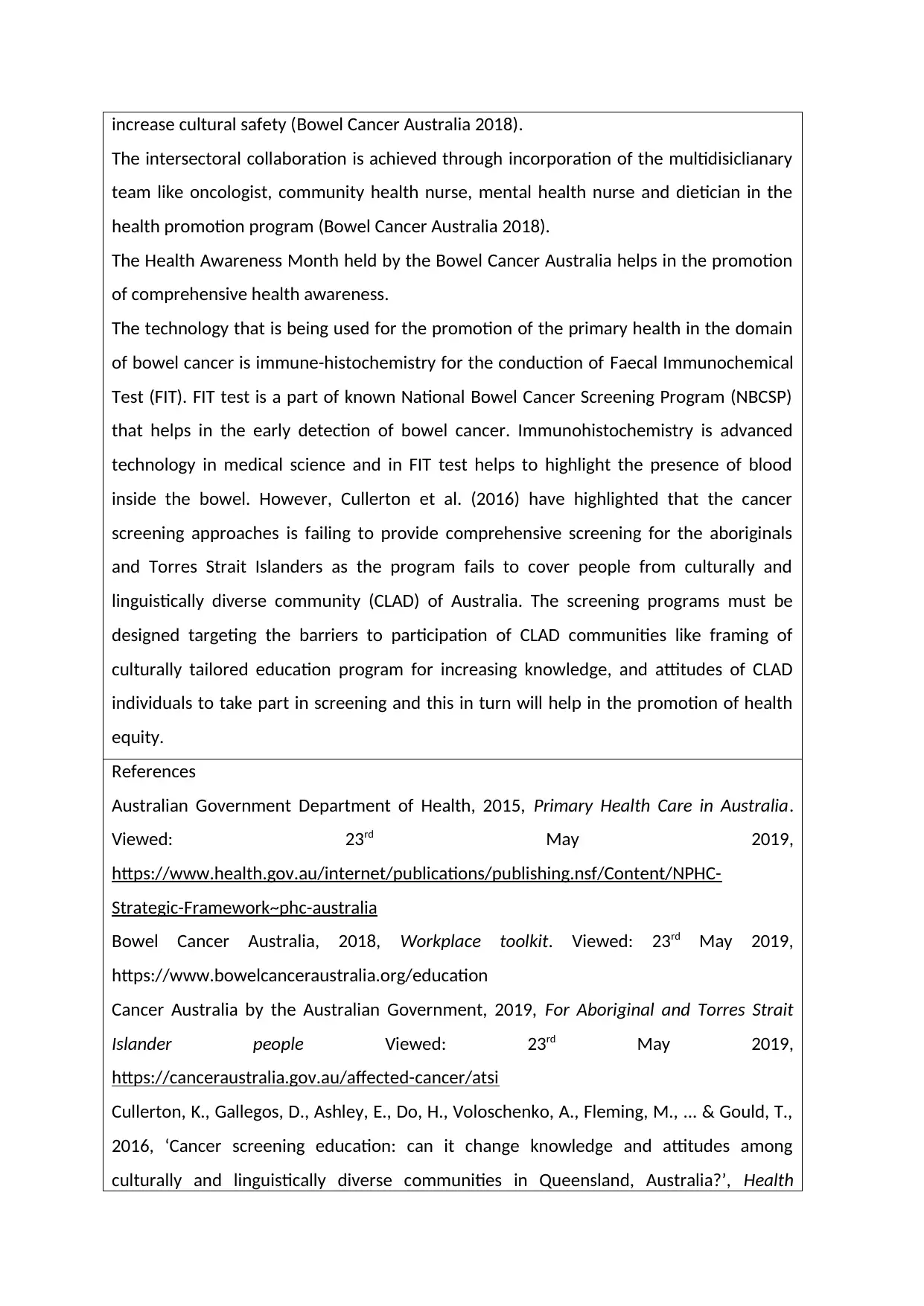
increase cultural safety (Bowel Cancer Australia 2018).
The intersectoral collaboration is achieved through incorporation of the multidisiclianary
team like oncologist, community health nurse, mental health nurse and dietician in the
health promotion program (Bowel Cancer Australia 2018).
The Health Awareness Month held by the Bowel Cancer Australia helps in the promotion
of comprehensive health awareness.
The technology that is being used for the promotion of the primary health in the domain
of bowel cancer is immune-histochemistry for the conduction of Faecal Immunochemical
Test (FIT). FIT test is a part of known National Bowel Cancer Screening Program (NBCSP)
that helps in the early detection of bowel cancer. Immunohistochemistry is advanced
technology in medical science and in FIT test helps to highlight the presence of blood
inside the bowel. However, Cullerton et al. (2016) have highlighted that the cancer
screening approaches is failing to provide comprehensive screening for the aboriginals
and Torres Strait Islanders as the program fails to cover people from culturally and
linguistically diverse community (CLAD) of Australia. The screening programs must be
designed targeting the barriers to participation of CLAD communities like framing of
culturally tailored education program for increasing knowledge, and attitudes of CLAD
individuals to take part in screening and this in turn will help in the promotion of health
equity.
References
Australian Government Department of Health, 2015, Primary Health Care in Australia.
Viewed: 23rd May 2019,
https://www.health.gov.au/internet/publications/publishing.nsf/Content/NPHC-
Strategic-Framework~phc-australia
Bowel Cancer Australia, 2018, Workplace toolkit. Viewed: 23rd May 2019,
https://www.bowelcanceraustralia.org/education
Cancer Australia by the Australian Government, 2019, For Aboriginal and Torres Strait
Islander people Viewed: 23rd May 2019,
https://canceraustralia.gov.au/affected-cancer/atsi
Cullerton, K., Gallegos, D., Ashley, E., Do, H., Voloschenko, A., Fleming, M., ... & Gould, T.,
2016, ‘Cancer screening education: can it change knowledge and attitudes among
culturally and linguistically diverse communities in Queensland, Australia?’, Health
The intersectoral collaboration is achieved through incorporation of the multidisiclianary
team like oncologist, community health nurse, mental health nurse and dietician in the
health promotion program (Bowel Cancer Australia 2018).
The Health Awareness Month held by the Bowel Cancer Australia helps in the promotion
of comprehensive health awareness.
The technology that is being used for the promotion of the primary health in the domain
of bowel cancer is immune-histochemistry for the conduction of Faecal Immunochemical
Test (FIT). FIT test is a part of known National Bowel Cancer Screening Program (NBCSP)
that helps in the early detection of bowel cancer. Immunohistochemistry is advanced
technology in medical science and in FIT test helps to highlight the presence of blood
inside the bowel. However, Cullerton et al. (2016) have highlighted that the cancer
screening approaches is failing to provide comprehensive screening for the aboriginals
and Torres Strait Islanders as the program fails to cover people from culturally and
linguistically diverse community (CLAD) of Australia. The screening programs must be
designed targeting the barriers to participation of CLAD communities like framing of
culturally tailored education program for increasing knowledge, and attitudes of CLAD
individuals to take part in screening and this in turn will help in the promotion of health
equity.
References
Australian Government Department of Health, 2015, Primary Health Care in Australia.
Viewed: 23rd May 2019,
https://www.health.gov.au/internet/publications/publishing.nsf/Content/NPHC-
Strategic-Framework~phc-australia
Bowel Cancer Australia, 2018, Workplace toolkit. Viewed: 23rd May 2019,
https://www.bowelcanceraustralia.org/education
Cancer Australia by the Australian Government, 2019, For Aboriginal and Torres Strait
Islander people Viewed: 23rd May 2019,
https://canceraustralia.gov.au/affected-cancer/atsi
Cullerton, K., Gallegos, D., Ashley, E., Do, H., Voloschenko, A., Fleming, M., ... & Gould, T.,
2016, ‘Cancer screening education: can it change knowledge and attitudes among
culturally and linguistically diverse communities in Queensland, Australia?’, Health
Paraphrase This Document
Need a fresh take? Get an instant paraphrase of this document with our AI Paraphraser
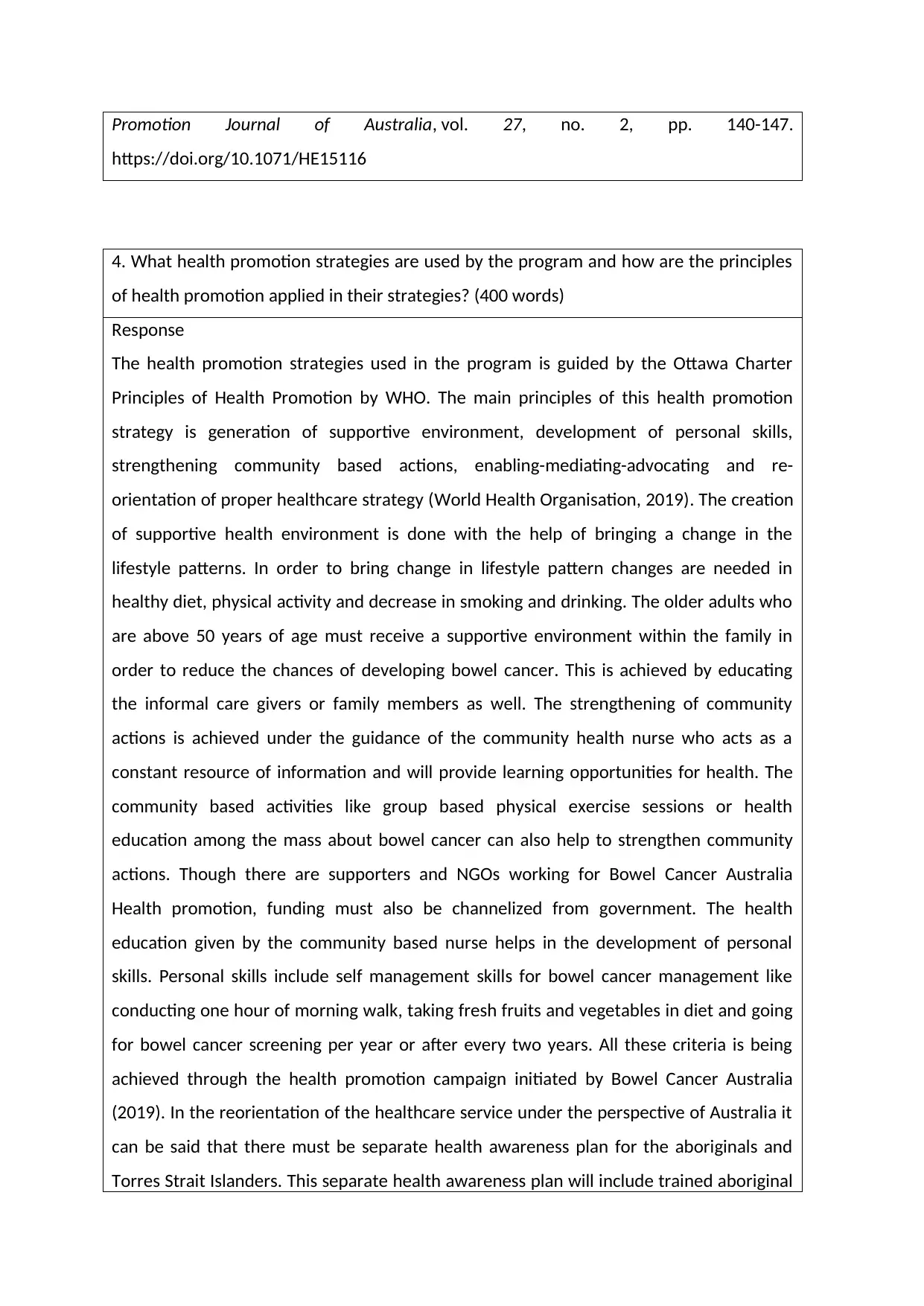
Promotion Journal of Australia, vol. 27, no. 2, pp. 140-147.
https://doi.org/10.1071/HE15116
4. What health promotion strategies are used by the program and how are the principles
of health promotion applied in their strategies? (400 words)
Response
The health promotion strategies used in the program is guided by the Ottawa Charter
Principles of Health Promotion by WHO. The main principles of this health promotion
strategy is generation of supportive environment, development of personal skills,
strengthening community based actions, enabling-mediating-advocating and re-
orientation of proper healthcare strategy (World Health Organisation, 2019). The creation
of supportive health environment is done with the help of bringing a change in the
lifestyle patterns. In order to bring change in lifestyle pattern changes are needed in
healthy diet, physical activity and decrease in smoking and drinking. The older adults who
are above 50 years of age must receive a supportive environment within the family in
order to reduce the chances of developing bowel cancer. This is achieved by educating
the informal care givers or family members as well. The strengthening of community
actions is achieved under the guidance of the community health nurse who acts as a
constant resource of information and will provide learning opportunities for health. The
community based activities like group based physical exercise sessions or health
education among the mass about bowel cancer can also help to strengthen community
actions. Though there are supporters and NGOs working for Bowel Cancer Australia
Health promotion, funding must also be channelized from government. The health
education given by the community based nurse helps in the development of personal
skills. Personal skills include self management skills for bowel cancer management like
conducting one hour of morning walk, taking fresh fruits and vegetables in diet and going
for bowel cancer screening per year or after every two years. All these criteria is being
achieved through the health promotion campaign initiated by Bowel Cancer Australia
(2019). In the reorientation of the healthcare service under the perspective of Australia it
can be said that there must be separate health awareness plan for the aboriginals and
Torres Strait Islanders. This separate health awareness plan will include trained aboriginal
https://doi.org/10.1071/HE15116
4. What health promotion strategies are used by the program and how are the principles
of health promotion applied in their strategies? (400 words)
Response
The health promotion strategies used in the program is guided by the Ottawa Charter
Principles of Health Promotion by WHO. The main principles of this health promotion
strategy is generation of supportive environment, development of personal skills,
strengthening community based actions, enabling-mediating-advocating and re-
orientation of proper healthcare strategy (World Health Organisation, 2019). The creation
of supportive health environment is done with the help of bringing a change in the
lifestyle patterns. In order to bring change in lifestyle pattern changes are needed in
healthy diet, physical activity and decrease in smoking and drinking. The older adults who
are above 50 years of age must receive a supportive environment within the family in
order to reduce the chances of developing bowel cancer. This is achieved by educating
the informal care givers or family members as well. The strengthening of community
actions is achieved under the guidance of the community health nurse who acts as a
constant resource of information and will provide learning opportunities for health. The
community based activities like group based physical exercise sessions or health
education among the mass about bowel cancer can also help to strengthen community
actions. Though there are supporters and NGOs working for Bowel Cancer Australia
Health promotion, funding must also be channelized from government. The health
education given by the community based nurse helps in the development of personal
skills. Personal skills include self management skills for bowel cancer management like
conducting one hour of morning walk, taking fresh fruits and vegetables in diet and going
for bowel cancer screening per year or after every two years. All these criteria is being
achieved through the health promotion campaign initiated by Bowel Cancer Australia
(2019). In the reorientation of the healthcare service under the perspective of Australia it
can be said that there must be separate health awareness plan for the aboriginals and
Torres Strait Islanders. This separate health awareness plan will include trained aboriginal
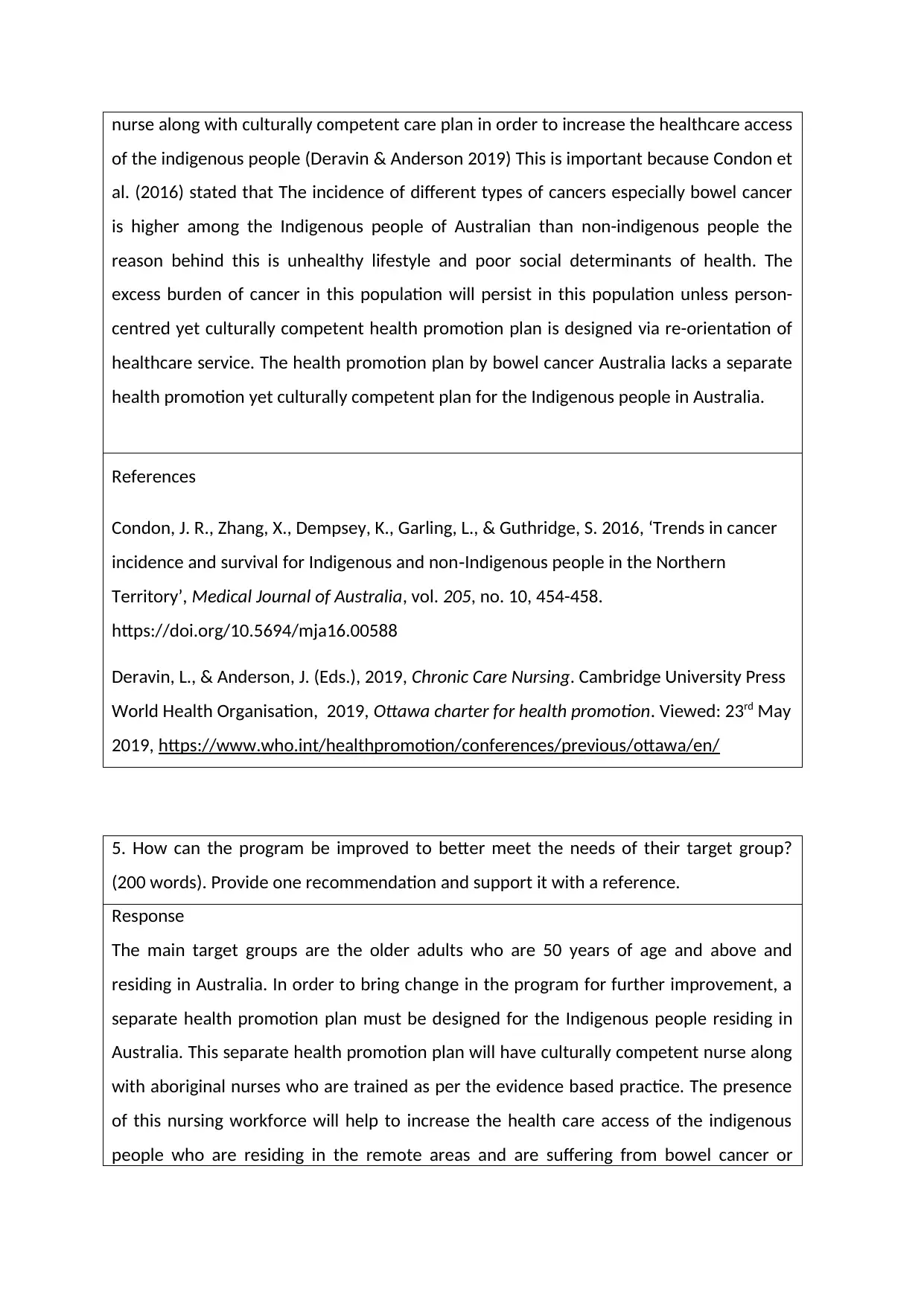
nurse along with culturally competent care plan in order to increase the healthcare access
of the indigenous people (Deravin & Anderson 2019) This is important because Condon et
al. (2016) stated that The incidence of different types of cancers especially bowel cancer
is higher among the Indigenous people of Australian than non-indigenous people the
reason behind this is unhealthy lifestyle and poor social determinants of health. The
excess burden of cancer in this population will persist in this population unless person-
centred yet culturally competent health promotion plan is designed via re-orientation of
healthcare service. The health promotion plan by bowel cancer Australia lacks a separate
health promotion yet culturally competent plan for the Indigenous people in Australia.
References
Condon, J. R., Zhang, X., Dempsey, K., Garling, L., & Guthridge, S. 2016, ‘Trends in cancer
incidence and survival for Indigenous and non‐Indigenous people in the Northern
Territory’, Medical Journal of Australia, vol. 205, no. 10, 454-458.
https://doi.org/10.5694/mja16.00588
Deravin, L., & Anderson, J. (Eds.), 2019, Chronic Care Nursing. Cambridge University Press
World Health Organisation, 2019, Ottawa charter for health promotion. Viewed: 23rd May
2019, https://www.who.int/healthpromotion/conferences/previous/ottawa/en/
5. How can the program be improved to better meet the needs of their target group?
(200 words). Provide one recommendation and support it with a reference.
Response
The main target groups are the older adults who are 50 years of age and above and
residing in Australia. In order to bring change in the program for further improvement, a
separate health promotion plan must be designed for the Indigenous people residing in
Australia. This separate health promotion plan will have culturally competent nurse along
with aboriginal nurses who are trained as per the evidence based practice. The presence
of this nursing workforce will help to increase the health care access of the indigenous
people who are residing in the remote areas and are suffering from bowel cancer or
of the indigenous people (Deravin & Anderson 2019) This is important because Condon et
al. (2016) stated that The incidence of different types of cancers especially bowel cancer
is higher among the Indigenous people of Australian than non-indigenous people the
reason behind this is unhealthy lifestyle and poor social determinants of health. The
excess burden of cancer in this population will persist in this population unless person-
centred yet culturally competent health promotion plan is designed via re-orientation of
healthcare service. The health promotion plan by bowel cancer Australia lacks a separate
health promotion yet culturally competent plan for the Indigenous people in Australia.
References
Condon, J. R., Zhang, X., Dempsey, K., Garling, L., & Guthridge, S. 2016, ‘Trends in cancer
incidence and survival for Indigenous and non‐Indigenous people in the Northern
Territory’, Medical Journal of Australia, vol. 205, no. 10, 454-458.
https://doi.org/10.5694/mja16.00588
Deravin, L., & Anderson, J. (Eds.), 2019, Chronic Care Nursing. Cambridge University Press
World Health Organisation, 2019, Ottawa charter for health promotion. Viewed: 23rd May
2019, https://www.who.int/healthpromotion/conferences/previous/ottawa/en/
5. How can the program be improved to better meet the needs of their target group?
(200 words). Provide one recommendation and support it with a reference.
Response
The main target groups are the older adults who are 50 years of age and above and
residing in Australia. In order to bring change in the program for further improvement, a
separate health promotion plan must be designed for the Indigenous people residing in
Australia. This separate health promotion plan will have culturally competent nurse along
with aboriginal nurses who are trained as per the evidence based practice. The presence
of this nursing workforce will help to increase the health care access of the indigenous
people who are residing in the remote areas and are suffering from bowel cancer or
⊘ This is a preview!⊘
Do you want full access?
Subscribe today to unlock all pages.

Trusted by 1+ million students worldwide
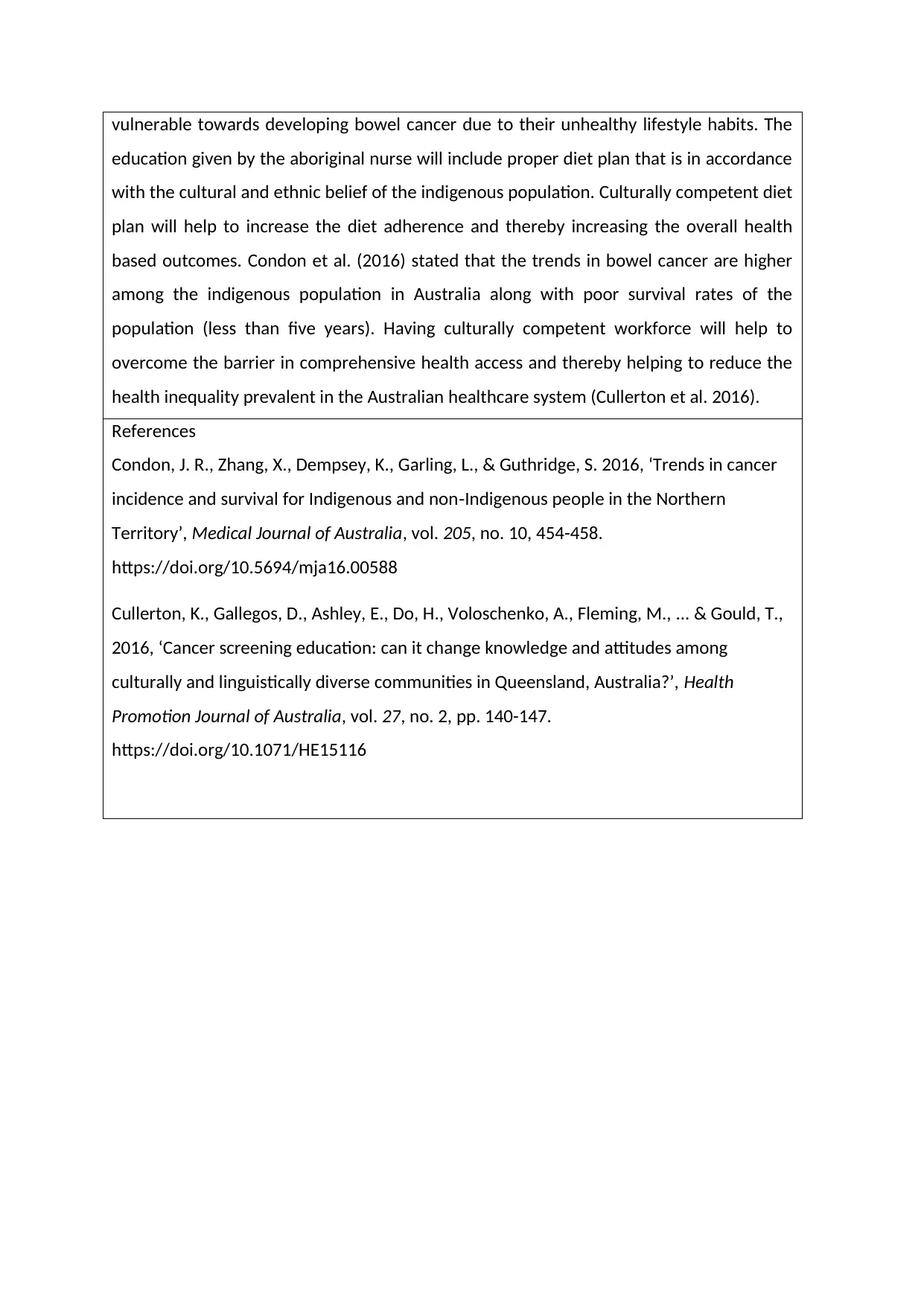
vulnerable towards developing bowel cancer due to their unhealthy lifestyle habits. The
education given by the aboriginal nurse will include proper diet plan that is in accordance
with the cultural and ethnic belief of the indigenous population. Culturally competent diet
plan will help to increase the diet adherence and thereby increasing the overall health
based outcomes. Condon et al. (2016) stated that the trends in bowel cancer are higher
among the indigenous population in Australia along with poor survival rates of the
population (less than five years). Having culturally competent workforce will help to
overcome the barrier in comprehensive health access and thereby helping to reduce the
health inequality prevalent in the Australian healthcare system (Cullerton et al. 2016).
References
Condon, J. R., Zhang, X., Dempsey, K., Garling, L., & Guthridge, S. 2016, ‘Trends in cancer
incidence and survival for Indigenous and non‐Indigenous people in the Northern
Territory’, Medical Journal of Australia, vol. 205, no. 10, 454-458.
https://doi.org/10.5694/mja16.00588
Cullerton, K., Gallegos, D., Ashley, E., Do, H., Voloschenko, A., Fleming, M., ... & Gould, T.,
2016, ‘Cancer screening education: can it change knowledge and attitudes among
culturally and linguistically diverse communities in Queensland, Australia?’, Health
Promotion Journal of Australia, vol. 27, no. 2, pp. 140-147.
https://doi.org/10.1071/HE15116
education given by the aboriginal nurse will include proper diet plan that is in accordance
with the cultural and ethnic belief of the indigenous population. Culturally competent diet
plan will help to increase the diet adherence and thereby increasing the overall health
based outcomes. Condon et al. (2016) stated that the trends in bowel cancer are higher
among the indigenous population in Australia along with poor survival rates of the
population (less than five years). Having culturally competent workforce will help to
overcome the barrier in comprehensive health access and thereby helping to reduce the
health inequality prevalent in the Australian healthcare system (Cullerton et al. 2016).
References
Condon, J. R., Zhang, X., Dempsey, K., Garling, L., & Guthridge, S. 2016, ‘Trends in cancer
incidence and survival for Indigenous and non‐Indigenous people in the Northern
Territory’, Medical Journal of Australia, vol. 205, no. 10, 454-458.
https://doi.org/10.5694/mja16.00588
Cullerton, K., Gallegos, D., Ashley, E., Do, H., Voloschenko, A., Fleming, M., ... & Gould, T.,
2016, ‘Cancer screening education: can it change knowledge and attitudes among
culturally and linguistically diverse communities in Queensland, Australia?’, Health
Promotion Journal of Australia, vol. 27, no. 2, pp. 140-147.
https://doi.org/10.1071/HE15116
Paraphrase This Document
Need a fresh take? Get an instant paraphrase of this document with our AI Paraphraser
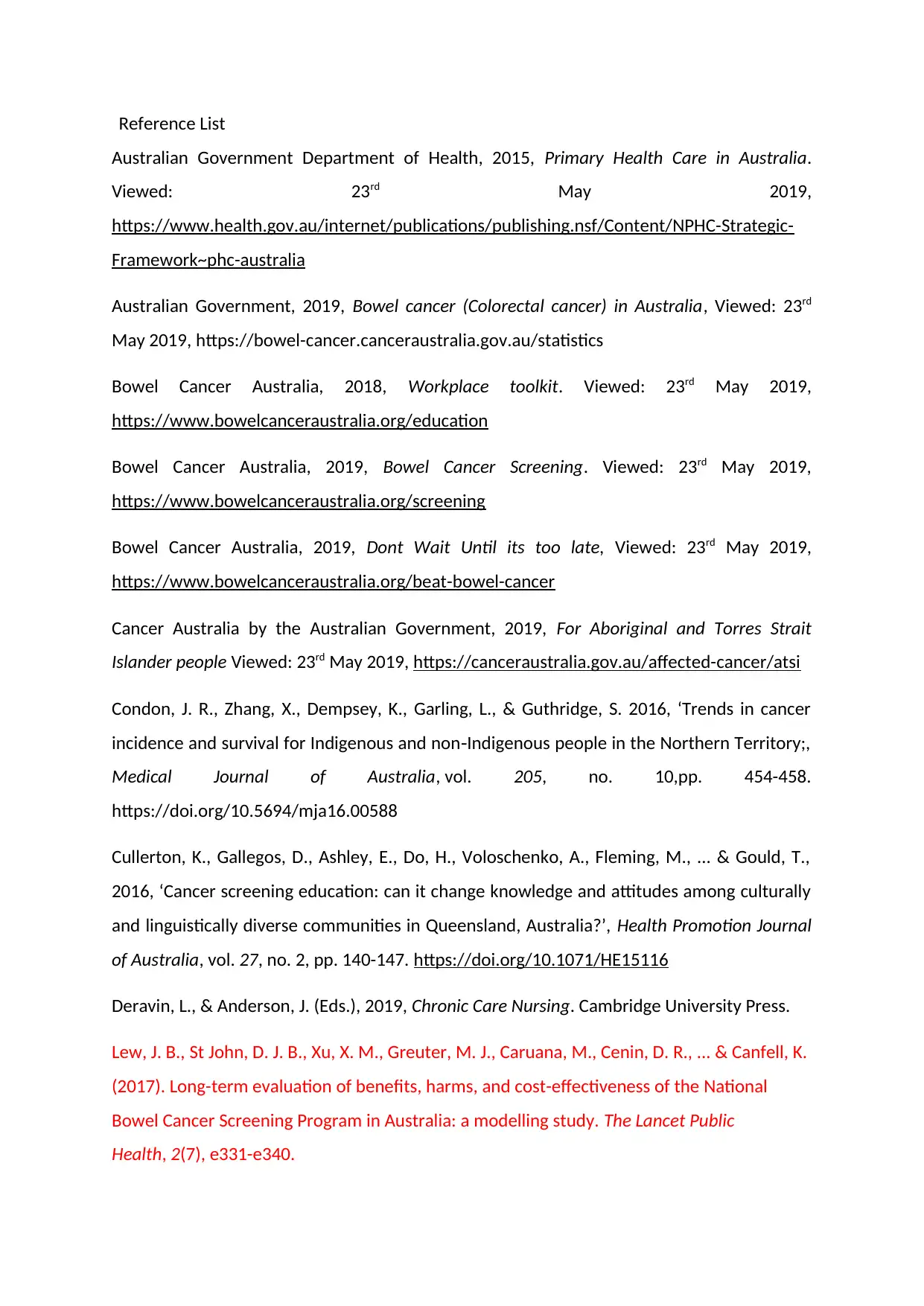
Reference List
Australian Government Department of Health, 2015, Primary Health Care in Australia.
Viewed: 23rd May 2019,
https://www.health.gov.au/internet/publications/publishing.nsf/Content/NPHC-Strategic-
Framework~phc-australia
Australian Government, 2019, Bowel cancer (Colorectal cancer) in Australia, Viewed: 23rd
May 2019, https://bowel-cancer.canceraustralia.gov.au/statistics
Bowel Cancer Australia, 2018, Workplace toolkit. Viewed: 23rd May 2019,
https://www.bowelcanceraustralia.org/education
Bowel Cancer Australia, 2019, Bowel Cancer Screening. Viewed: 23rd May 2019,
https://www.bowelcanceraustralia.org/screening
Bowel Cancer Australia, 2019, Dont Wait Until its too late, Viewed: 23rd May 2019,
https://www.bowelcanceraustralia.org/beat-bowel-cancer
Cancer Australia by the Australian Government, 2019, For Aboriginal and Torres Strait
Islander people Viewed: 23rd May 2019, https://canceraustralia.gov.au/affected-cancer/atsi
Condon, J. R., Zhang, X., Dempsey, K., Garling, L., & Guthridge, S. 2016, ‘Trends in cancer
incidence and survival for Indigenous and non Indigenous people in the Northern Territory;,‐
Medical Journal of Australia, vol. 205, no. 10,pp. 454-458.
https://doi.org/10.5694/mja16.00588
Cullerton, K., Gallegos, D., Ashley, E., Do, H., Voloschenko, A., Fleming, M., ... & Gould, T.,
2016, ‘Cancer screening education: can it change knowledge and attitudes among culturally
and linguistically diverse communities in Queensland, Australia?’, Health Promotion Journal
of Australia, vol. 27, no. 2, pp. 140-147. https://doi.org/10.1071/HE15116
Deravin, L., & Anderson, J. (Eds.), 2019, Chronic Care Nursing. Cambridge University Press.
Lew, J. B., St John, D. J. B., Xu, X. M., Greuter, M. J., Caruana, M., Cenin, D. R., ... & Canfell, K.
(2017). Long-term evaluation of benefits, harms, and cost-effectiveness of the National
Bowel Cancer Screening Program in Australia: a modelling study. The Lancet Public
Health, 2(7), e331-e340.
Australian Government Department of Health, 2015, Primary Health Care in Australia.
Viewed: 23rd May 2019,
https://www.health.gov.au/internet/publications/publishing.nsf/Content/NPHC-Strategic-
Framework~phc-australia
Australian Government, 2019, Bowel cancer (Colorectal cancer) in Australia, Viewed: 23rd
May 2019, https://bowel-cancer.canceraustralia.gov.au/statistics
Bowel Cancer Australia, 2018, Workplace toolkit. Viewed: 23rd May 2019,
https://www.bowelcanceraustralia.org/education
Bowel Cancer Australia, 2019, Bowel Cancer Screening. Viewed: 23rd May 2019,
https://www.bowelcanceraustralia.org/screening
Bowel Cancer Australia, 2019, Dont Wait Until its too late, Viewed: 23rd May 2019,
https://www.bowelcanceraustralia.org/beat-bowel-cancer
Cancer Australia by the Australian Government, 2019, For Aboriginal and Torres Strait
Islander people Viewed: 23rd May 2019, https://canceraustralia.gov.au/affected-cancer/atsi
Condon, J. R., Zhang, X., Dempsey, K., Garling, L., & Guthridge, S. 2016, ‘Trends in cancer
incidence and survival for Indigenous and non Indigenous people in the Northern Territory;,‐
Medical Journal of Australia, vol. 205, no. 10,pp. 454-458.
https://doi.org/10.5694/mja16.00588
Cullerton, K., Gallegos, D., Ashley, E., Do, H., Voloschenko, A., Fleming, M., ... & Gould, T.,
2016, ‘Cancer screening education: can it change knowledge and attitudes among culturally
and linguistically diverse communities in Queensland, Australia?’, Health Promotion Journal
of Australia, vol. 27, no. 2, pp. 140-147. https://doi.org/10.1071/HE15116
Deravin, L., & Anderson, J. (Eds.), 2019, Chronic Care Nursing. Cambridge University Press.
Lew, J. B., St John, D. J. B., Xu, X. M., Greuter, M. J., Caruana, M., Cenin, D. R., ... & Canfell, K.
(2017). Long-term evaluation of benefits, harms, and cost-effectiveness of the National
Bowel Cancer Screening Program in Australia: a modelling study. The Lancet Public
Health, 2(7), e331-e340.
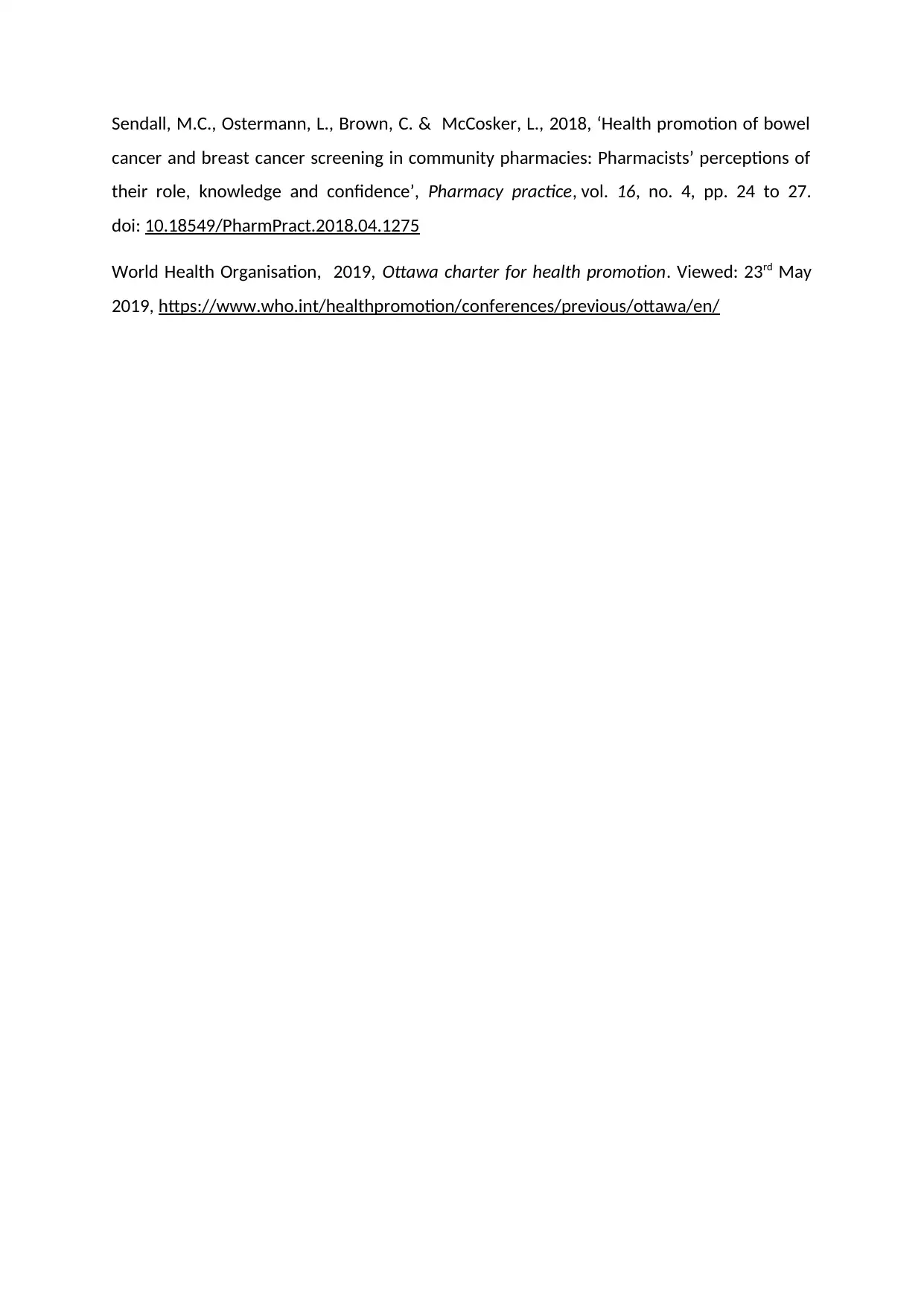
Sendall, M.C., Ostermann, L., Brown, C. & McCosker, L., 2018, ‘Health promotion of bowel
cancer and breast cancer screening in community pharmacies: Pharmacists’ perceptions of
their role, knowledge and confidence’, Pharmacy practice, vol. 16, no. 4, pp. 24 to 27.
doi: 10.18549/PharmPract.2018.04.1275
World Health Organisation, 2019, Ottawa charter for health promotion. Viewed: 23rd May
2019, https://www.who.int/healthpromotion/conferences/previous/ottawa/en/
cancer and breast cancer screening in community pharmacies: Pharmacists’ perceptions of
their role, knowledge and confidence’, Pharmacy practice, vol. 16, no. 4, pp. 24 to 27.
doi: 10.18549/PharmPract.2018.04.1275
World Health Organisation, 2019, Ottawa charter for health promotion. Viewed: 23rd May
2019, https://www.who.int/healthpromotion/conferences/previous/ottawa/en/
⊘ This is a preview!⊘
Do you want full access?
Subscribe today to unlock all pages.

Trusted by 1+ million students worldwide
1 out of 9
Related Documents
Your All-in-One AI-Powered Toolkit for Academic Success.
+13062052269
info@desklib.com
Available 24*7 on WhatsApp / Email
![[object Object]](/_next/static/media/star-bottom.7253800d.svg)
Unlock your academic potential
Copyright © 2020–2026 A2Z Services. All Rights Reserved. Developed and managed by ZUCOL.





